Putin’s goal is to restore Russian pride and power
On every level, Vladimir Putin has confected this Ukraine invasion like a chess grandmaster, carefully moving his pieces into place over many months to prepare for this terrible moment.
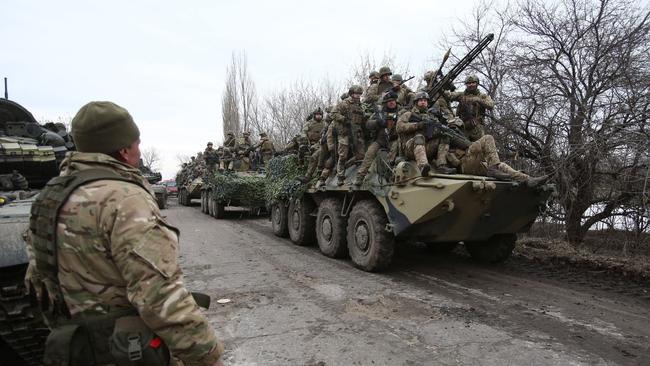
The Russian President has orchestrated an unspeakable carnage as innocent Ukrainians cower under a brutal onslaught of bombs and tanks in scenes more reminiscent of Hitler’s invasion of Poland than modern Europe.
The rest of the world, including Australia, is watching in jaw-dropping horror at Russia’s invasion, hurling its collective disgust at Putin and threatening to impose evermore sweeping financial and economic sanctions on Moscow.
And yet the West is all but powerless to stop this war. It can only watch on helplessly as Putin drives a stake through the heart of those who naively believed the fall of the Berlin Wall three decades ago marked the end of Russian despots. An unprovoked attack on a major European power was confined to the history books, or so we thought.
What is remarkable about his attack on Ukraine is how Putin, a lifelong risk-taker, has managed to turn the odds in this crisis so heavily in his favour. At least for now.
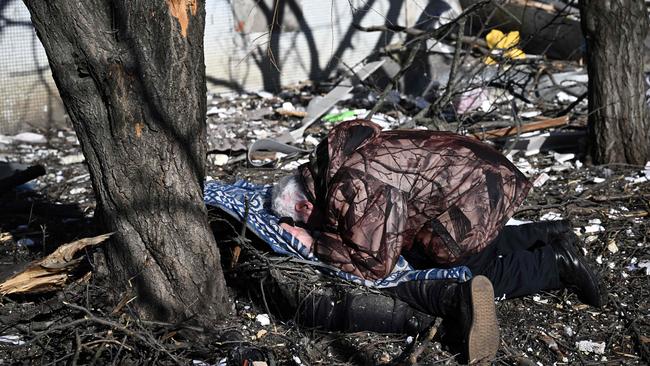
The US and NATO will not bend in their refusal to intervene militarily to defend Ukraine, which is not a NATO member. Even if there were a will to try to defend Ukraine militarily, a war fought right on Russia’s border would come at a cost in lives that no Western nation would accept.
From his vantage point in the Kremlin, Putin sees nothing but opportunity. He sees a divided Europe which too often seemed more concerned about losing access to Russian gas supplies than it was about the invasion of a sovereign nation. He sees a polarised America, weary of foreign wars with an ageing President who is still damaged by the chaotic US withdrawal from Afghanistan.
Polls this week show just 26 per cent of Americans think the US should play a major role in the Russia-Ukraine conflict, giving Joe Biden little room to move.
With China, Putin has worked assiduously in recent months to forge closer links with Beijing and neutralise any opposition on Ukraine.
As Michele Flournoy, the top Pentagon policy official in the Obama administration, says; “We’re seeing that while Beijing doesn’t really like Putin’s tactics, they’re willing to band together as authoritarian states against the Western democracies.”
In the meantime, Putin has slowly and methodically ensured that his invasion, which began in earnest on Thursday, is likely to be a military rout given that he had surrounded Ukraine on three sides with more than 170,000 Russian troops backed by tanks, missiles and overwhelming firepower.
This week, Putin put the final touches on his invasion plans by giving a tortured re-imagining of Ukrainian history to try to argue that Kyiv had no rights as a sovereign nation. Putin’s message to Russians is that an invasion of Ukraine is really not an invasion of another country, but a reclaiming of a lost part of Russia, like a spiritual reunion of long lost friends. It is an argument that sinks under scrutiny but which exploits popular nostalgia for the Soviet empire, the loss of which Putin has called “the greatest geopolitical disaster of the 20th century”.
On every level, Putin has confected this Ukraine invasion like a Russian grand master in chess, carefully moving his pieces into place, politically, militarily and psychologically, over many months to prepare for this terrible moment.
As such he is on the cusp of something he has spent decades longing for.
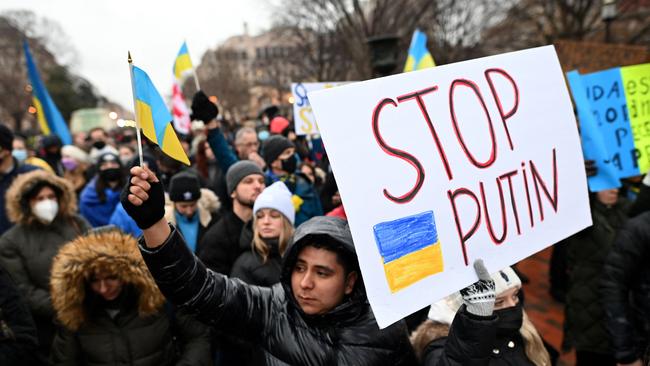
“Putin’s overarching aim is reversing the consequences of the Soviet collapse, splitting the transatlantic alliance and renegotiating the geographic settlement that ended the Cold War,” says former US intelligence officer Angela Stent. “The current crisis between Russia and Ukraine is a reckoning that has been 30 years in the making. It is much more than Ukraine and its possible NATO membership. It is about the future of the European order crafted after the Soviet Union’s collapse.”
Biden was equally blunt about Putin’s ambitions. Putin “has much larger ambitions than Ukraine. He wants to, in fact, re-establish the former Soviet Union. That’s what this is about,” he says.
The question is why now? After all, Putin made similar claims about Ukraine being a natural part of greater Russia when he invaded Ukraine’s Crimea Peninsula in 2014, yet he stopped short of attacking the rest of the country.
At that time, citing Crimea’s long history as part of Russia, Putin said of Crimea: “This strategic territory should be under a strong, sovereign state and that in fact can only be Russia.”
Putin justifies this week’s invasion of Ukraine on the spurious grounds that the country could be a “springboard” for a NATO attack against Russia.
NATO has certainly provoked Russia by progressively expanding eastwards since the end of the Cold War. But Ukraine is no closer now to joining NATO than it was in 2014. Putin has made a series of impossible demands on NATO, one of which is to promise that there will be no further expansion of the pact, including Ukraine.
For reasons which only Putin can truly know, this was his moment to act.
“The President of the Russian Federation is operating at a higher risk-tolerance level,” says Lieutenant General Ben Hodges who commanded the US Army in Europe from 2014 to 2017. “He is confident because we, the West, have not stopped him before or forced him to back down.”
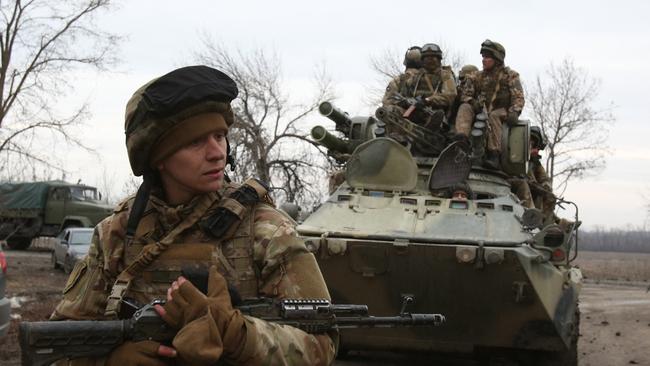
But Putin’s decision to invade still comes with significant risk, even if he knows that Russia cannot be defeated militarily by the far smaller Ukraine army.
The size and scale of the sanctions which the West are now set to impose on Russia will dwarf those previously imposed on Moscow for Putin’s annexation of Crimea in 2014 or his invasion of Georgia in 2008.
The US and Europe initially announced relatively modest sanctions this week, reserving the toughest measures for a full scale invasion. Biden claims his planned sanctions will effectively cut Russia off from Western financing and inflict grievous harm on Russia’s economy and its leadership. German chancellor Olaf Scholz, who had previously been noncommittal about tough sanctions, this week agreed to put the $11bn Nord Stream 2 gas pipeline on hold, a move that will deny Moscow increased energy sales to Europe. This is one measure that will directly hurt Russia, but it also hits the EU which receives one third of its energy from Russia.
Russian sanctions will also hurt Europe, the US and the global economy and it will be a test of Western resolve to maintain them and increase them. Putin knows that mega-sanctions will damage Russia’s already stagnant economy, but it is obvious that he has already factored this into his overall plan on Ukraine. Putin has planned for this day and for these sanctions. Ever since the West imposed sanctions on Russia after the 2014 annexation of Crimea, Putin has been working to make Russia’s economy “sanction proof” by boosting foreign reserves, buying gold, and exporting more from neutral countries like China. Russia’s central bank has $US630bn in reserves of foreign exchange and gold, having grown from $US368bn in 2015. It would take a complete collapse of Russia’s economy – an unlikely scenario – for Putin’s leadership to be jeopardised.
The greater risk for Putin in invading Ukraine is not the immediate military outcome, but rather the long-term plan if Russian troops were to become an occupying force.
It is expected that Putin’s overwhelmingly superior Russian forces will conquer Ukraine in a relatively short period of time. But then what?
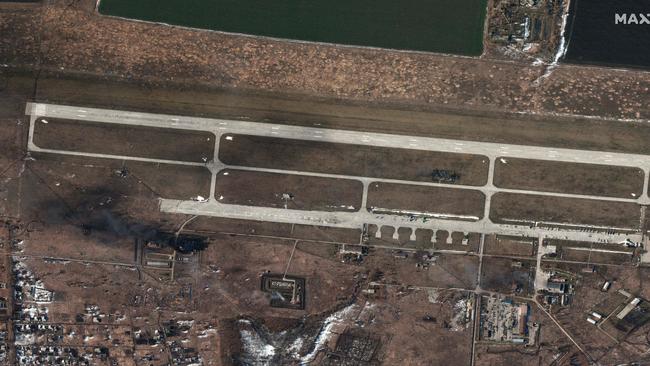
Ukraine is a democratic country of 44 million people, the majority of whom like their democracy and their freedoms and who say, according to the polls, that they would like their country to one day become a member of NATO.
In announcing his invasion, Putin claimed that he does not intend to occupy Ukraine, but rather seeks to “demilitarise” the country. But it is unclear how he can exert real control over Ukraine without keeping Russian troops there.
By invading and continuing to occupy Ukraine, Putin risks a military quagmire where Russian troops are drawn into a guerrilla-style war against pro-Ukrainian militia. This is what doomed Russia in Afghanistan in the 1980s.
And then there is the vast human cost, although Putin gives no sign of caring about this. US intelligence estimates project an all-out invasion of Ukraine would see between 25,000 and 50,000 civilians killed or wounded, and between 5000 and 25,000 Ukrainian troops and 3000 to 10,000 Russian troops killed or wounded. It would be easily the most devastating conflict in Europe since World War II.
Putin has been careful to keep his options open and watch how the world reacts. His decision early in the week to formally recognise the independence of the breakaway pro-Russian areas of Donetsk and Luhansk in the Donbas region of eastern Ukraine and then start sending Russian forces only into that disputed region initially confounded the US and Europe. Was it a true “invasion” and what level of sanctions should be imposed on Moscow?
It was only on Thursday when Putin launched his bombing campaign in Kyiv and other cities that his true intentions became clear.
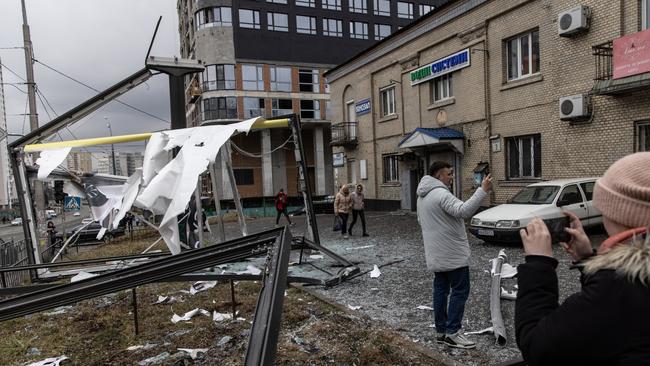
Putin’s journey to this point in history has been a deeply personal one. When the Berlin Wall fell in 1989 and the Soviet Union disintegrated, he was a KGB officer based in Dresden in Germany. His life’s work to that point became meaningless overnight. Suddenly millions of Russians found themselves living outside Russia, in newly independent countries like Ukraine. A smaller, weaker Russia saw 41 per cent of its GDP vanish overnight. It was no longer a superpower
Putin claimed in a recent speech that he, like millions of Russians, fell on hard times in the 1990s as he tried to remake his life. He even claimed to have been a taxi driver for a while, saying: “Honestly, it’s not very pleasant to speak about.”
After the fall of the Soviet Union, “people found themselves abroad overnight, taken away, this time indeed from their historical motherland”, Putin wrote last year in a 5000-word essay which was delivered to Russian troops.
Putin speaks bitterly about what he calls the broken promises from the West at the time that NATO would never extend eastwards beyond Germany.
Observers say a turning point for the Russian President was the decision by NATO to turn eastwards in 2004 and grant membership to Bulgaria, Estonia, Latvia, Lithuania, Romania, Slovakia and Slovenia.
In 2007, Putin angrily accused the US of going too far and of having “overstepped its borders in every way”. NATO’s expansion, he said, was also “a serious provocation that reduces everybody’s trust”.
Then in 2008, NATO prematurely declared that Georgia and Ukraine “will become members of NATO”. It was one provocation too far for Putin who invaded Georgia later that year.
Putin has also detested what he sees as the belittling of Russia by the West in the post Cold War years. The late US senator John McCain famously disparaged Russia as a “gas station masquerading as a country”, while Barack Obama would refer to Moscow as merely a “regional power”.
Rodric Braithwaite, the British ambassador to Moscow when the Soviet Union collapsed, believes Putin’s wounded pride about the collapse of the Soviet Union is shared by many ordinary Russians.
“What Putin says about the humiliation of the Soviet collapse, the enlargement of NATO, and the intimate historical link between Russian and Ukrainian history is not his own idea,” Braithwaite says.
“Millions of Russians think and feel just like he does.”
But the scale of the attack on Ukraine has also shocked many Russians, with thousands taking to the streets to protest before being subdued by police.
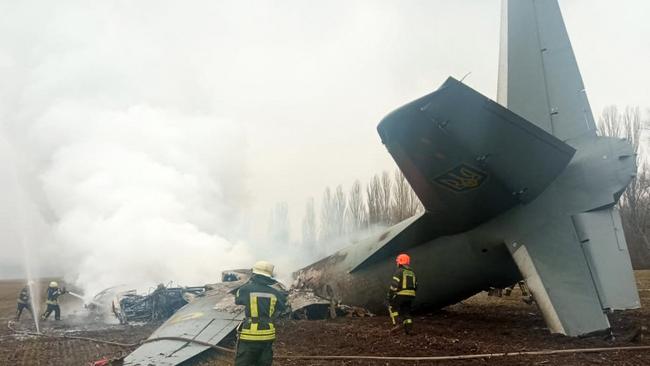
Putin’s speech this week days before the invasion saw him reach new levels of sentimental extremes about Ukraine to publicly justify what was about to unfold.
“Ukraine is an inalienable part of our own history, culture and spiritual space,” Putin said.
“These are our comrades, those dearest to us – not only colleagues, friends and people who once served together, but also relatives, people bound by blood, by family ties.”
He portrayed Russia as the victim. “Ukraine will serve as the springboard for the strike (against Russia),” Putin claimed without evidence. “If our ancestors had heard about it, they probably would simply not have believed it. And today, they don’t want to believe it but it’s true.”
Putin continued on this theme when he announced the Russian offensive on Thursday, saying Russia couldn’t “tolerate the threat that emanates from modern” Ukraine. He asserted that the attack was needed to protect pro-Russian civilians in Donbas – even though his forces also attacked infrastructure in Kyiv and across the country.
“We were simply left with no chance to act otherwise,” Putin told a meeting of Russian business leaders this week.
Putin has ordered this military offensive knowing that it will come at great cost to US and European prestige. He knows that Biden is ultimately impotent to control what now happens in Ukraine.
The US President has sent more American troops to Europe and will reposition them around the Baltic States. Biden has said he will not send in troops to fight Russia in Ukraine but has vowed to defend any attack on a NATO member should Putin seek to expand his strikes beyond Ukraine’s borders. Sanctions and angry rhetoric are all that Washington, Europe and Australia can throw at Moscow for now.
America’s inability to persuade Putin to back down is a historic diplomatic failure and the gut-wrenching images this week bombs exploding across Ukraine will only heighten the sense of helplessness that many in the West feel. It has the potential to gravely hurt Biden’s presidency. A new Gallup poll shows just 36 per cent of Americans approve of how Biden has handled the situation with Russia, while 55 per cent disapprove. Worst of all, especially for Australia, is the fear that Western impotence over Ukraine could embolden China over Indo-Pacific flashpoints like Taiwan and the South China Sea.
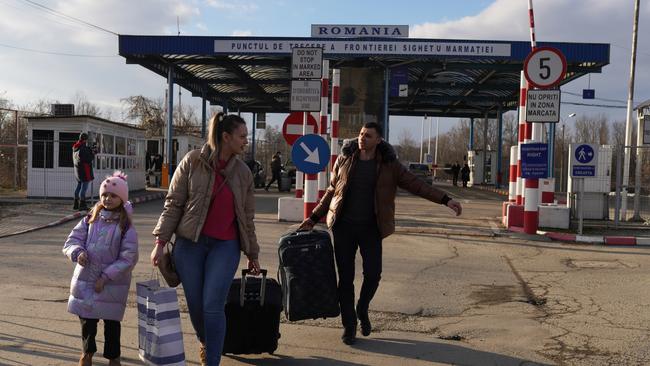
But this is all a part of Putin’s plan. By invading Ukraine he has forced Washington to look to Europe at a time when it wants to concentrate on the challenge of a rising China in the Indo-Pacific.
As The Wall Street Journal puts it: “Russia’s audacious military assault on Ukraine is the first major clash marking a new order in international politics. This emerging order leaves the US contending with two adversaries at once in geographically disparate parts of the world.”
Ever since he came to power in 1999, Putin has been a risk-taker. He has subjugated democracy in Russia to effectively anoint himself as a dictator and has surprised the West with his boldness in sending Russian troops into Syria, annexing Crimea and invading Georgia.
But Putin’s invasion of Ukraine dwarfs his previous excesses. In the eyes of the West, he will now sit in the pantheon of Russian tyrants alongside Stalin and Lenin.
As Biden put it: “Who in the Lord’s name does Putin think gives him the right to declare new so-called countries on territory that belonged to his neighbours?”
Biden is right when he says Putin has created this “premeditated war” in Ukraine and that “Russia alone is responsible for the death and destruction this attack will bring”.
But in the same breath Biden also claims that “the world will hold Russia accountable”. The burning question is how?


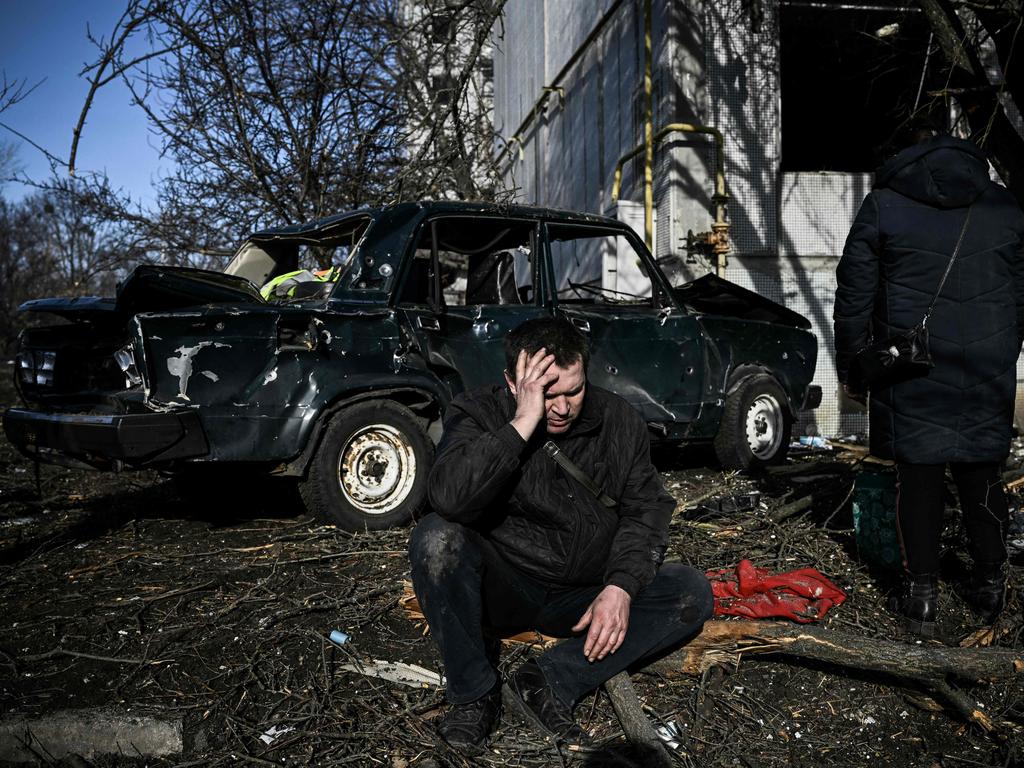

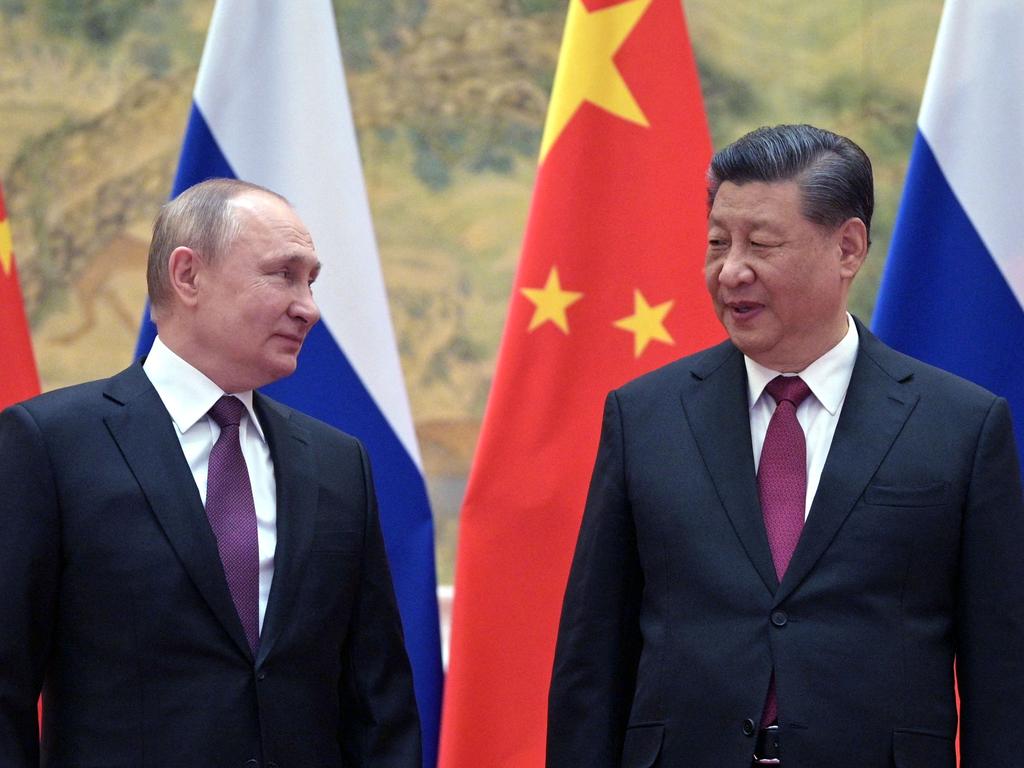
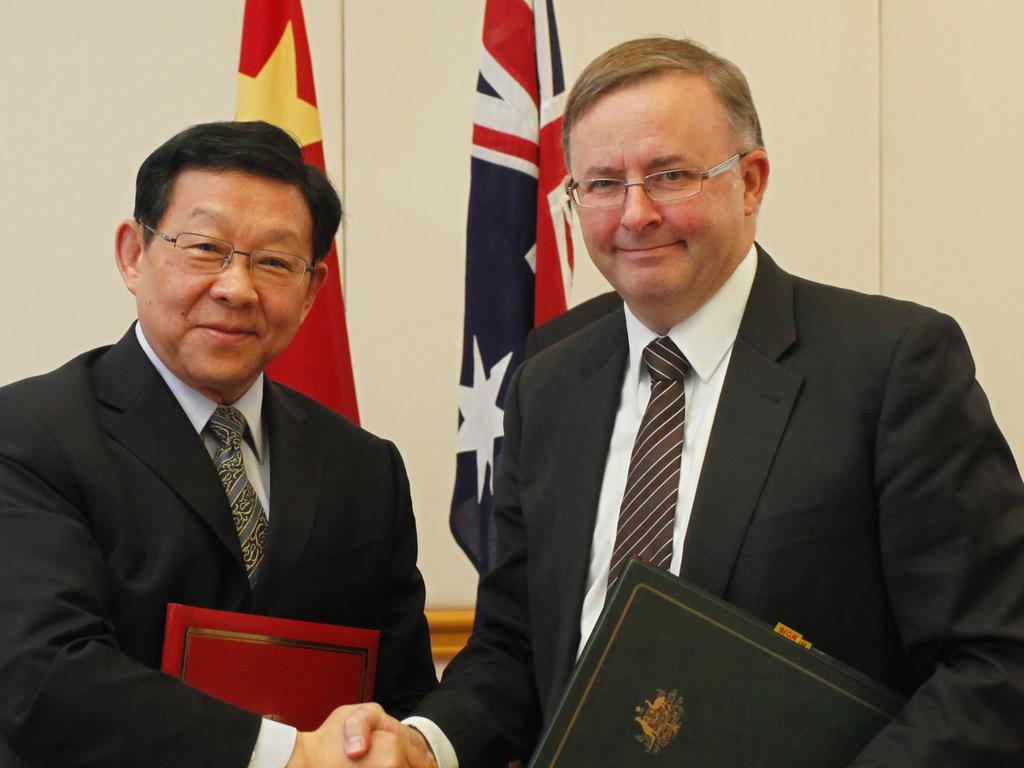
Vladimir Putin has embarked on his biggest gamble, one that will redraw the map of Europe, trigger devastating war and partly restore his beloved Soviet empire.